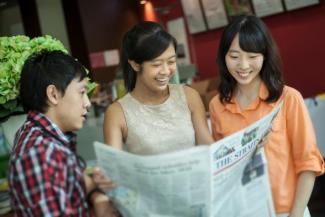
SMU made front page news, followed by leading articles and an opinion piece in both the Straits Times and Business Times in January 2014. What caused the stir were its plans to expand the curriculum to include humanities and applied mathematics as well as to develop a residential SMU Village – all of which were met with favourable reactions from journalists and editors.
The news first broke on 13 January on the front page of The Straits Times.
SMU makes bold plans to expand university
School of humanities, applied maths degree, residential college in the works
By Sandra Davie, Senior Education Correspondent
THE Singapore Management University (SMU) is moving beyond being a business university to a more comprehensive model with new offerings in the humanities and even applied mathematics.
Its 7,000 undergraduates in business, law, information systems management, accountancy, economics and social science will be able to study subjects in history, literature and philosophy when a school of humanities is set up in the next few years.
The university will also offer a full degree course in applied mathematics, a field which trains students to apply mathematical knowledge to solve problems in areas from finance to genomics.
Also on the cards is a short-stay residential college, or "SMU Village", for students to incubate their project ideas.
The university is in talks with the relevant government agencies to build the village, which will have rooms to house 600 students. A likely location is the car-park behind the Peranakan Museum at Armenian Street, which has been earmarked for SMU's future development.
SMU's governing board chairman Ho Kwon Ping said the university, set up in 2000 as a specialised business university modelled on the American Wharton School of Business, will be striking out in a slightly different direction.
"We no longer see ourselves as a specialised business school, but one that stands out for its courses and research in the management of all fields including health care, public policy and art," he said.
"Going forward, we also want to be rooted in the social, and natural sciences as well as the humanities, a comprehensive university in the European sense."
Applied mathematics complements the university's course offerings now and SMU already has professors in the field, he added.
SMU president Arnoud De Meyer said the university was also ready to "embrace" its location within the city. "We don't want to be an academic island within the city. We want to be part and parcel of the city and be a change agent within it," he said, adding that the university was planning to undertake research and projects that will impact the city.
On the plan to offer the humanities, he said: "If we want to develop our students into leaders, shouldn't they know about the history, art, culture and literature of the region?"
Mr Ho said SMU may offer a degree in the liberal arts in future, should the humanities courses prove to be popular.
With a residential college, project-based learning – extensively used in the university – will grow, said Professor De Meyer.
"The space will allow groups of students to spend a few weeks to a few months to live together, incubate their projects and see them to fruition."
He added that his aim is for all SMU students to spend some time in the village, which will be ready within the next five years.
"We want all our students to have this residential experience, just as all our students have some form of overseas exposure ... It will build the 'SMU difference' in our students," he said, referring to the reputation that his students have gained among employers for being more polished, outspoken and articulate than their peers from other local institutions.
Said Mr Ho of SMU's next phase of development: ''We want to do more than management. We want to now grow beyond the word 'M', just as MIT (Massachusetts Institute of Technology) today is more than an institute of technology."
Source: The Straits Times ®Singapore Press Holdings Limited. Permission required for reproduction.
The Straits Times, 13 January 2014, page A1
SMU’s move to diversify is a positive step
On the day after The Straits Times broke the news, The Business Times followed up with a leading editorial which declared that SMU’s plans were a “move in the right direction – both for itself as well as for the wider higher-education landscape in Singapore”.
The Business Times, 14 January 2014, page 18
Developing well-rounded business grads
A leading editorial in The Straits Times one week later explained how the plans announced by SMU supported Singapore’s drive towards producing adaptable graduates “who can do much better than crunch numbers and make PowerPoint presentations.” The leader concluded that the plans were ambitious for a university in only its 14th year, “but its standing in the community says it is getting most things right.
The Straits Times, 21 January 2014, page A21
Adding diversity to the university scene
SMU’s plans to expand its curriculum and build a short-stay residential college continued the University’s successful strategy of differentiating itself from the other five universities in Singapore, wrote Sandra Davie, The Straits Times’ Senior Education Correspondent. SMU Chairman Mr Ho Kwon Ping said the larger objective was to offer a business education with a difference and in the process turn out a different type of graduate for employers.